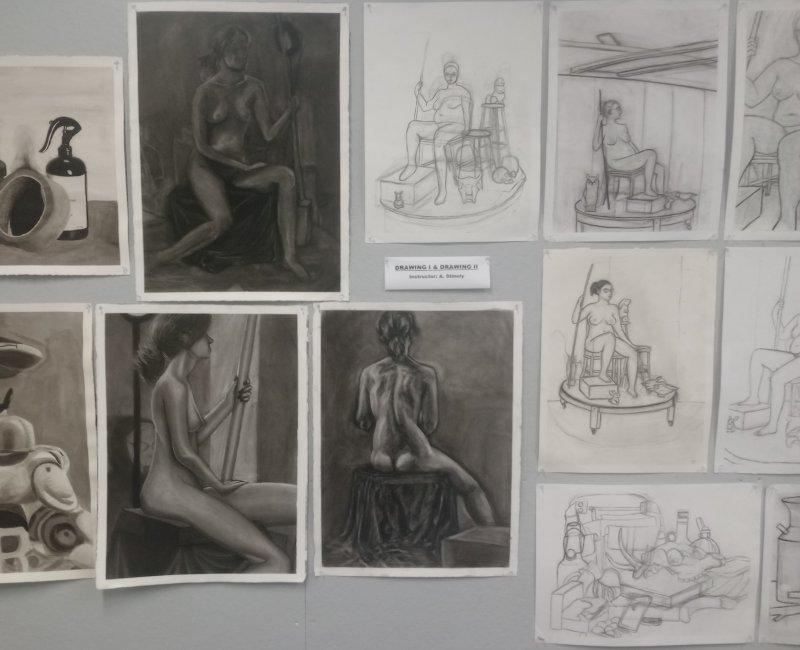Live Modeling Offers Hands-On Learning for Art Students at PennWest Edinboro


One of the greatest benefits to being an art major on Pennsylvania Western’s Edinboro campus is the many tools that the campus puts at the disposal of its artist students. One such tool is the use of live art models in almost all drawing classes, allowing students to have a first-hand experience in drawing the human form, and also allowing for students on campus to make some money.
Beginning in late November and continuing until the first week of January, the art department will be accepting applications for models. The applications will be located right outside of Hamilton Hall 201 and can be filled out and turned into Terrence McKelvey at his office in Hamilton Hall 201. No experience is required, and all modeling will take place in a supervised environment. The pay for an art model is $20 an hour, and students can expect to model for two to two-and-a-half hours each session, limited to two times a week so that modeling does not interfere with student’s class schedule.
Terrence McKelvey, Edinboro campus’s art model coordinator, advertises, reviews, interviews and makes the hiring decisions for the models on campus. Once models are hired for the semester, McKelvey creates the schedules based on model requests from professors and the demands of Figure Friday.
Figure Fridays are live figure drawing sessions from the model that are available most Fridays during the semester in Loveland Hall Studio 7. Students can practice drawing from life, human anatomy, and experiment with different techniques and mediums outside of normal class time.
Kathryn Curtis, a senior illustration major and art history minor, says that Figure Fridays have a very laid-back environment. Curtis said that she goes to Figure Fridays semi-frequently, at least four to five times per semester.
“The drawing and painting club folks are lovely, and everyone is very open and friendly, including the models.” Curtis said. “If you want to chat while working that’s fine, if you want to put on headphones and tune everyone out that is also fine. It truly is a place where you can approach your art however you want. You get what you put in basically.”
McKelvey said that there is a lot of benefit to having live model sessions on campus and that the sessions set Pennsylvania Western Edinboro campus apart from other Art programs at different colleges.
“We have a number of faculty who have extensive experience working from the figure, plus a faculty member who specializes in Anatomy for artists (Michelle Vitali), and our Human Anatomy course is a rarity in contemporary Art programs,” McKelvey said. “Animators benefit from studying the figure, and the figure has been a traditional subject of study in fine art (painting, drawing, sculpture, etc.) for hundreds of years.
Working from the figure allows students to connect to that timeless tradition.”
Curtis added that working from a live model is the greatest and most important privilege a fledging artist has, and that she has learned a lot from her own firsthand experiences with drawing from the figure in studio classes and during Figure Friday.
“Photography can help in a pinch for referencing poses, but by drawing from life an artist can truly grasp the organic gestures in the human body... Observing that in real time while drawing forces us to treat the subject more loosely...” Curtis said. “Also, by working from the model, artists will train their muscle memory to remember what certain muscles and proportions look like.”
The art department on Edinboro’s campus is always looking for more models that meet the list of requirements: must pass background checks, models must be limber, must have enough stamina to hold various longer poses, must be reliable and punctual, and must be comfortable modeling completely nude in front a supervised classroom. McKelvey also said that the art department hires a variety of different body types, with there being a preference towards models who do not have large areas of tattoos, since tattoos will obscure the surface structure of the model’s anatomy.
Curtis said that she wishes that Edinboro campus’s modeling pool had a larger selection of male models, older models and ethnically diverse models, though it does a good job of displaying body types from muscular, to plus sized, and includes transgender models as well. McKelvey agreed, stating that the university rarely ever gets model applications from males, and is often asked why the university doesn’t have more male models for studios and Figure Friday.
Art modeling is useful not only to growing a student’s technical abilities, but McKelvey said that modeling has conceptual and communal impacts as well.
“Some Art students who work as models have also mentioned that modeling has given them formal and conceptual ideas for their personal artwork and have generally found modeling to be complementary to their personas as aspiring artists,” McKelvey said. “It's also an interesting way to deepen one's connection to the Edinboro campus Art community.”
Curtis encourages art majors to take advantage of the free resource of art models on campus while they can, as after students graduate, they will have to start paying for their own models or find organizations that host live model lessons in their area.
Students interested in modeling for the art department and looking for more information can contact Terrence McKelvey at email tmckelvey@pennwest.edu, at the phone number 814-732-1155, or visit him at his office in Hamilton 201.
“When I was first hired in 1998, I thought it was strange and weird that we hired students, including our own Art students, to be models.” McKelvey said. “Now, I think that Art students often make the best models, due to their innate interest in the subject of art.”











